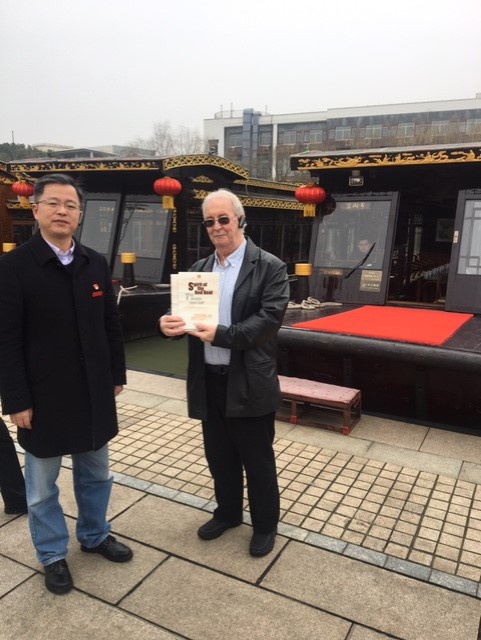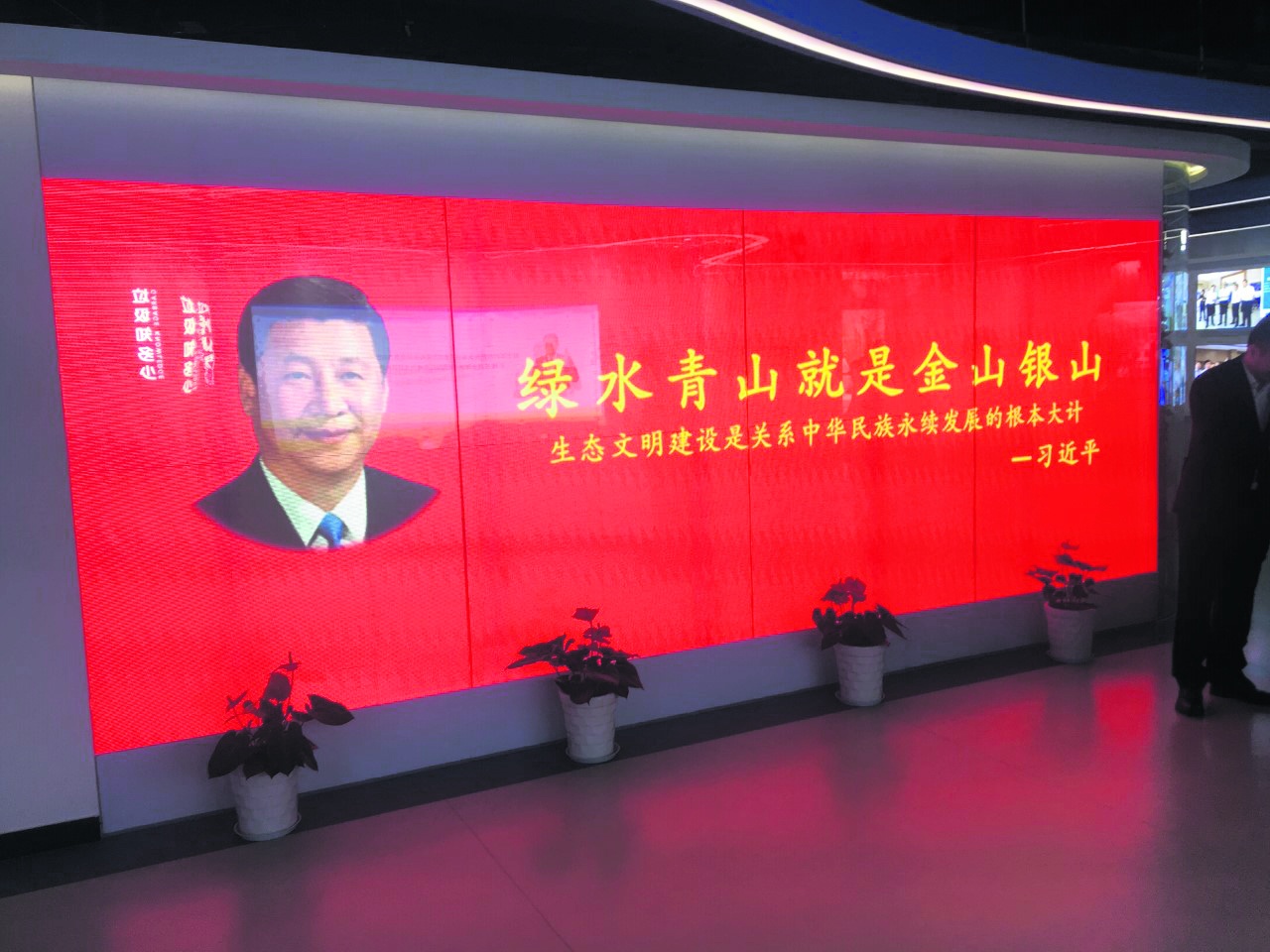This is the last article you can read this month
You can read more article this month
You can read more articles this month
Sorry your limit is up for this month
Reset on:
Please help support the Morning Star by subscribing here
EARLIER this year Communist Party of Britain (CPB) representatives took part in a joint delegation of Communist parties from northern Europe and North America following an invitation from the International Department of the Communist Party of China (CPC).
CPB general secretary Rob Griffiths was accompanied by women’s officer Carol Stavris and national election officer and executive committee member Jonathan Havard.
There were also two delegates from the New Communist Party and three from the Communist Party of Great Britain (Marxist Leninist). There were other Communist Party representatives from Canada, Finland, Norway, Sweden and the US.

During this extensive and wide-ranging visit, delegates visited the Nanhu Revolutionary Memorial Museum to learn about the early history of the CPC which emerged out of the May the Fourth Movement following the end of the first world war.
There was also an opportunity to visit the famous Red Boat where the first national congress of the CPC was convened in July 1921.
This was followed by a visit to the Zhejiang Red Boat Executive Leadership Academy for a seminar on the CPC party building at grassroots level.
Havard argued the delegation was a clear example of a CPC strategy to develop better relations internationally.
“On the one hand they are developing diplomatic links with the capitalist world. On the other hand they are maintaining links with what’s left of the socialist countries including North Korea — if you regard that as a socialist country — and also with communist parties across the world.”
As part of the tour delegates attended a meeting with an official from the All-China Women’s Federation established in 1949 which acts as the official leader of the women’s movement in China.
Havard points out that women’s rights are highly topical following conference organised by China’s Women University and the Freidrich Ebert University in November 2018 in Shanghai.
Issues discussed included childcare and care-giving — something that is particularly pertinent given that only 4 per cent of children aged three or under are in nursery care in China.
He also argues that China is still largely a patriarchal society despite some progress.
“China is still male dominated — however women are revered in the same way older people are. You look at government structures party structures and society in general women are in the same position as in the so-called First World countries.”
In November 2013 the CPC decided to relax the “one-child policy” which had originally been introduced in 1980 in order to counteract China’s extensive population growth encouraged in the early Maoist period.
However based on his experience in China, Havard feels that this decision may have be re-examined in the future.
“It’s because the economy is expanding so quickly and so exceptionally they are discovering that they need to loosen the policy and it’s no longer in place. They will come to a point where they review where they started from and the reason it was introduced in the first place.”
Another key meeting was with officials from the central committee of the Communist Youth League and Havard was impressed by their ideological and philosophical grounding as well as the hurdles they have to overcome to obtain membership.
“It’s preparing for the next generation — when you look at Xi Jinping, he’s very much portrayed as a family man with his parents and kids so it’s very much portraying family life. They’re getting away from the old guard style.
“You have to pass a test to be a Communist Party member. You have to have a philosophical understanding of Marxist Leninism. You don’t automatically join — you have to show you have an understanding of what the party is about.”
Responding to the accusation often made in the West that some CPC members, particularly the younger generations, are joining for instrumental and pragmatic purposes to further their careers, Havard admits this could be a possibility.
“When you’ve got a strong ruling party in place you can learn the ropes and climb up for your own purpose. Didn’t Gorbachov do that in the Soviet Union?”
Another visit the delegation made was to Hangzhou Environmental Group where they viewed a waste disposal plant as well as recycling and reducing the need for landfill sites — however, Havard admits that China’s environmental record and contribution to reducing climate change is mixed.
“They are very conscious of the use of carbon fuels and moving away from that. From what we’ve read and seen it seems this is a genuine thing so they are investing in recycling moving away from carbon energy very much razing old factories to the ground and making them green areas again.
“However while they are focusing on a move away from fossil fuels and moving to green energy in China itself, they are exporting a significant amount of rubbish produced by the cheap goods that we buy.”
China has received a great deal of criticism from certain sections of the left in recent decades for supposedly selling out to capitalism or becoming “state capitalist.”
In response, the CPC has described their own pathway as “Socialism with Chinese characteristics.” However what does Havard think this means today — and is Xi Jinping leading a neo-Maoist revival, as some in the West argue?
“Their utilising capitalism to move forward to a modern First World society is entirely based upon Marxist Leninist theory. It’s difficult to define the Chinese characteristics but they would say they have learnt from the mistakes of the collapse of the Soviet Union. I think they’ve looked at the Yugoslavian model, leaving aside what happened in the break-up of Yugoslavia, but the actual economic model of Tito’s market socialism.”
China is often criticised for its human rights record intentionally so how did Havard approach this subject during the delegation and where any insights gained in relation to this during the visit?
“The human rights issue is in the background in the literature they give you. Freedom of religion is mentioned, but there are certain things they won’t tolerate such as organisations plotting the overthrow of the party.
“They very much emphasise democratic freedoms such as the fact that the Communist Party is one of seven or eight parties that can stand in elections. In reality though everything has to be vetted by the party so it’s nowhere near what we would call a liberal democracy.
“It was kind of an unspoken thing that you wanted to ask questions about Tiananmen Square but it was never asked. My view in relation to Tiananmen if they do reopen it in some way it will put it to bed — however maybe they fear if you start opening the Pandora’s box it will weaken their authority.”
Havard was also critical of the very limited role of trade unions in Chinese society, arguing that in most cases it was the CPC that organised workplaces.

“That’s one area they can develop — trade unions need to play a bigger role, they shouldn’t be a subsidy of the party. Trade unions aren’t persecuted or oppressed but I think they are an add-on with the party machine running workplaces. Their idea of independent trade unions is not the same as ours.”
Despite huge economic growth since the 1970s, which the World Bank has described as “the fastest sustained expansion by a major economy in history — and has lifted more than 800 million people out of poverty,” there is still a significant rural and urban divide in terms of wealth.
For example, the delegation discovered that the average income in urban areas is 57,000 yuan while it is 34,000 yuan in rural areas.
“The Chinese will freely admit there is still a big chasm between wealth in urban areas and in rural areas — the chasm is so great there is actually a different minimum wage for rural and urban areas. But they’ve continued to move away from what we would term ‘absolute poverty’ and if you did a study I think you would probably find more poverty in Britain.
“In recent years the CPC has attempted to reduce poverty in rural areas by raising rural farmer’s income and promoting new types of agricultural businesses. In the long term this might gradually lead to the end of the substantial rural migration to the cities.
“At the same time socialist planning could become more important as wages will be affected as labour in urban areas may become scarcer as investment and transport links improve life in rural areas. Only time will tell if rural China will soon be able to share the increasing prosperity of urban areas.”










